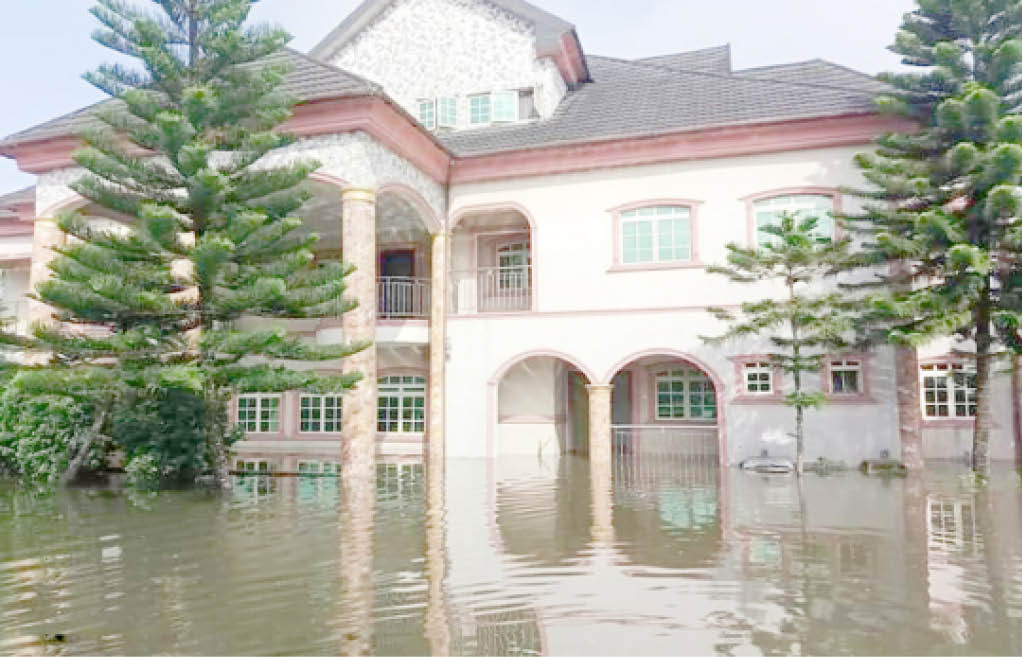Tales of Rivers residents sacked by flood
In Rivers rural communities, the rich and poor are telling stories of pain, frustration and agony as rampaging flood sacked more than 100 communities, mostly located along the banks of Orashi River and its tributaries across Ahoada East, Ahoada West, Ogba/Egbema/Ndoni and Abua Odua local government areas of the state. Daily Trust on Sunday reports […]

A flooded mansion
In Rivers rural communities, the rich and poor are telling stories of pain, frustration and agony as rampaging flood sacked more than 100 communities, mostly located along the banks of Orashi River and its tributaries across Ahoada East, Ahoada West, Ogba/Egbema/Ndoni and Abua Odua local government areas of the state. Daily Trust on Sunday reports that in many of the oil-rich rural communities, houses and other properties were affected by the life-threatening flood.
The rampaging flood also submerged bridges, farms and schools, while many of the residents, who are predominantly farmers, were forced to harvest their cassava and other farm produce prematurely.
Food Prices Soar As Floods Disrupt Supply Chains
Flood victims must not be abandoned
Some of the communities worst hit by the flood are Ndoni, Mbede, Ebocha, Ukwunzi, Obirikom, Egbeda, Joinkrama, Edoha, Egbema, Obiofu, Utu-Umuoriji, Ase-Azaga, Ogbeogene, Utuechi and Agwe.
Others are Kriegani, Aligewu, Idu-Obasiukwu, Idu-Osobile, Agbogwe, Usomini, Omoku, Obieti and Ebeocha.
Many of the residents affected in Ahoada West are taking refuge in four displaced persons camps created by the local government area in Akinima, Mbiama, Ubeta and Okogbe, while those who could not be accommodated in the camps were relocated to neighbouring communities, where they are taking shelter in friends’ and relatives’ residences.
Daily Trust on Sunday reports that this is not the first time the affected communities were displaced by flood. In fact, the situation has become a reoccurring decimal in four local government areas of Orashi tributaries. Between 2012 and 2022, over 300 communities were displaced, while properties and farmlands worth millions of naira were destroyed.

The four local government areas affected by the flood, our correspondent learnt, are notable for rich farm produce as majority of residents are predominantly farmers. Cassava, plantain, yam, vegetables and fruits are harvested in large quantities in the area.
The devastation caused by the flood is already having a multiplier effect on the economy of the state as prices of food items have skyrocketed beyond the reach of residents.
Many of the affected residents are wearing long faces and narrating their pathetic stories.
At the Mbiama camp, where many of the displaced residents were accommodated, some of the victims lamented how they lost their farms and property.
One of the displaced residents, Akina Beatrice, said their houses and farmlands were submerged.
She narrated, “We lost everything in our houses because the flood took us unawares. And we could not harvest any of our crops because our farmlands were submerged. We had plantain, yam and cassava in our farms, but all of them were washed off by the rampaging flood. We were brought here by the local government area but life has been very tough. Life will never be the same again.”
Another displaced resident at the camp, Akiode Ikechukwu, narrated how he escaped from the flood.
“It started gradually and we thought it was an ordinary flood until our entire compounds were taken over. The flood was almost getting to the window level when we hurriedly moved out. We left our properties behind and they have been washed off. Our farms were also affected, so we could not harvest any of our crops. The experience is not pleasant at all,” he also narrated.
At Mbede, where the palace of the traditional ruler, Eze Chadwick Ogor, was submerged, residents are also counting their losses.
A resident of the area who simply gave his name as Ahaikwo said, “There are tears all over the community. People lost their houses, valuable properties and farmlands. We are predominantly farmers but nobody in this community was able to harvest their crops. The same thing is applicable to all the residents. We want the government to come to our aid, otherwise many people will have serious problems.”
The chairman of Ahoada West Local Government Area, Evangelist Hope Ikiriko, said 71 communities were affected in the area.
He assured the victims of government’s efforts at cushioning the effects of the flood through the provision of relief materials and more facilities in various displaced persons camps.
Dr Victor Ahiakwo, leader of the Ogba/Egbema/Ndoni Local Government Legislative Assembly, described the situation as heart-touching, saying the responsibility should not be left for the government alone.
He called on both the federal and state governments, multi-nationals and cooperate bodies to come to the aid of the council with relief materials to help in cushioning the effects of the flood on the people, saying that is the only way humanity can benefit from them in this trying time.
The South South zone of the National Emergency Management Agency (NEMA) had early this year warned residents of flood-prone areas of the state to relocate because of expected floods. Many of the residents could not heed to the advice as many of them have no place to go.
In the meantime, Governor Nyesom Wike has approved the sum of N1billion for emergency relief measures to support flood victims in the affected local government area.
The governor also set up a taskforce to coordinate the distribution of relief materials to the affected communities. He said the permanent secretary, Special Services Bureau (SSB) in the Office of the Secretary to the Rivers State Government, Dr George Nwaeke, would serve as the chairman of the taskforce, while Mrs Inime I. Aguma is the secretary.
Other members of the taskforce are the chairmen of Ahoada West and Ogba/Egbema/Ndoni local government areas, Ikiriko and Vincent Job; Chukwuemeka Onowu and the director of administration in the Ministry of Special Duties.
